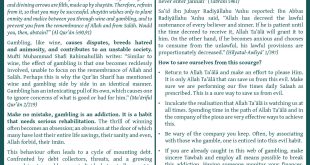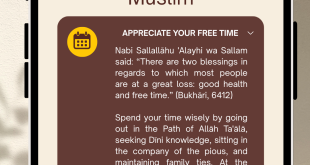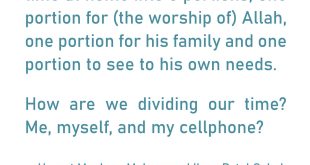Educational trends are fast evolving. Future education seems to be leaning towards distance learning. The ease and convenience it offers make it the go-to choice for many a parent. Should this also be an option for our Maktab system?
Knowledge is heart-to-heart
From the beginning of time, Dīn was transmitted from person to person, and from heart to heart. Never was a scripture sent without a Nabī; a personal and physical Mu’allim, to teach it.
Jibrīl ‘Alayhis-Salām appeared before Nabī Sallallāhu ‘Alayhi wa Sallam in the cave of Hirā’ and physically embraced him, thereby starting off the chain of revelation. Nabī Sallallāhu ‘Alayhi wa Sallam then physically taught the Dīn to the Sahābah Radhiyallāhu ‘Anhum, who in turn taught the Tabi’īn, and so on. When the time came to send letters of da’wah to the rulers, a Sahābi was sent with it.
‘Ilm is Nūr (divine light)
The Ustādh Of Imām As-Shafi’ī Rahimahullāh told him regarding ‘Ilm: “Verily ‘Ilm is Nūr from my Rabb, and the Nūr of Allāh Ta’ālā is not given to a sinner…”
The knowledge of Dīn carries a special spiritual light with it that transmits from teacher to student. This Nūr and spirituality can never be transmitted through a screen.
The Necessary Adab (respect and etiquette)
It has been said that Dīn, the entirety of it, is Adab! The extent that a person will benefit from his knowledge is in accordance with the amount of respect and etiquette he shows to his teacher, the knowledge, and all the instruments of this knowledge. In the famous Hadīth known as Hadīth Jibrīl, Jibrīl ‘Alayhis-Salām came to Nabī Sallallāhu ‘Alayhi wa Sallam in the form of a student. He came close, sat with respect and asked specific questions.
This served to teach us the etiquette of a student. This can only be inculcated and nurtured in a child under the watchful eye of a teacher. The holding of the Qur’ān Karīm and other books with respect, sitting with respect and being attentive to the lesson are all necessary for progress. This can only be taught and maintained in a physical classroom.
The effect of one’s company
The word ‘suhbah” means to be in someone’s company. The Sahābah Radhiyallāhu ‘Anhum got their name from this, due to them staying in the company of Nabī Sallallāhu ‘Alayhi wa Sallam. It was this link with Nabī Sallallāhu ‘Alayhi wa Sallam that turned them into people that future generations would aspire to be like.
The effect of one’s company can never be overestimated. Their manners and habits rub off on him. That is why our children must spend the few years of their Maktab education in the company of pious ‘Ulamā’. This will have an amazing effect on them and will help to mould their beliefs, manners and habits correctly.
Allāh Ta’ālā tells us: “O you who believe, fear Allāh and be with the Sādiqīn (the truthful/pious ones).” [Al-Qur’ān 9/119]
Many who have attended the Maktab will attest that their main link to Dīn is their Maktab teacher. For many, the only ‘Ālim they know or have a relationship with is their Maktab teacher. Can we afford to deprive our children of this link?
The legacy of sacrificing for Dīn
Allāh Ta’ālā says: “Those who strive in our way, we will most definitely guide them.” [Al-Qur’ān 29/69] Sacrifice for Dīn is necessary for guidance. The glorious history of Islām bears testimony to the thousands of journeys undertaken by the scholars of Dīn to far-off lands for the learning and disseminating of Dīnī knowledge.
Just as those before us sacrificed, we should be ready to do so as well. For the sake of avoiding the discomfort of transporting our children to and from the Maktab, are we ready to pour water over their rich legacy?
Self Study?
The pious scholars have always placed great importance on one having a shaykh over him. This was to the extent that they wouldn’t give any consideration to one who merely studied from books. This was because they understood that true action and understanding of ‘ilm will only come when one has a teacher guiding him through the books.
Qādhī ‘Iyādh Rahimahullāh mentions a story of a certain scholar who wrote to some ‘Ulamā’ of the time. He didn’t agree with certain actions of theirs. Instead of answering him as they would normally, they merely responded: “Be silent! You have no shaykh.”
The pitfalls associated with online studies
Parents who experienced online learning during the covid period will attest that maintaining proper discipline and system is nearly impossible. Do we want to have children sitting in shorts on their beds, having a snack, whilst an essential part of Dīn is explained on the screen? Will the love for Dīn ever enter a child’s heart when during a lesson, he is browsing the internet and looking at evil? A parent recently related to an ustādh that their child forgot how to recite the Qur’ān Karīm during the year away from the proper system. May Allāh Ta’ālā protect us!
Our rich history of Makātib in South Africa
Alhamdulillāh, from the time Tuan Guru Rahimahullāh established the first “maktab” in Cape Town up to the present, South Africa has served as a model to other countries in the establishment of a Maktab system. This was firmly built on the legacy of face-to-face learning as taught to us by our pious predecessors. So why tamper with this tried and tested method and thereby risk the Dīn of our future generations?
May Allāh Ta’ālā grant us the ability to hold on to Dīn and its method of transmission as shown to us by Nabī Sallallāhu ‘Alayhi wa Sallam and his illustrious Sahābah Radhiyallahu ‘Anhum. Āmīn.
16 Jumādal Aakhirah 1444 /09 January 2023 A0035
 Wifāq ul Ulāma (SA) ASSOCIATION OF SOUTH AFRICAN 'ULAMA
Wifāq ul Ulāma (SA) ASSOCIATION OF SOUTH AFRICAN 'ULAMA



